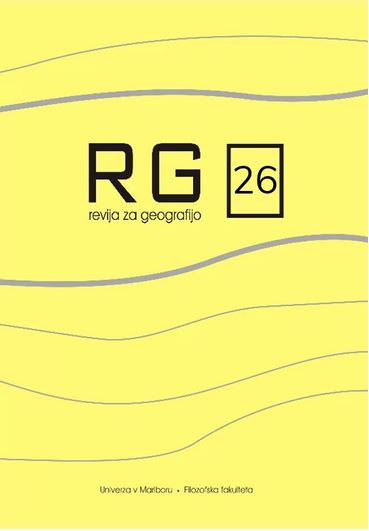Heat waves in Maribor between 1961-2018
DOI:
https://doi.org/10.18690/rg.13.2.3713Keywords:
heat wave, urban heat island, urban environment living quality, MariborAbstract
The article discusses the state and trends in the frequency of occurrence of heat waves, their duration and intensity in Maribor, based on data from the meteorological station Maribor-Tabor in the period 1961-2018. All three indicators show a clear positive trend. Particularly severe are trends in heat wave frequency and intensity. The average length of heat waves in Maribor is increasing as well, but the trend is less pronounced. Some local differences in the intensity of the urban heat island phenomenon during a heatwave period in Maribor were detected by applying remotely sensed data and the resulting land surface temperature variable from the Landsat 8 satellite.
Downloads
References
Bonan, G. 2008: Ecological Climatology. Concepts and Applications. Cambridge University Press. Cambridge.
Bertalanič, R., Demšar, M., Dolinar, M., Dvoršek, D., Nadbath, M., Pavčič, B., Roethel-Kovač, M., Vertačnik, G., Vičar, Z., 2010: Podnebna spremenljivost Slovenije. ARSO. Ljubljana.
EEA, 2012: Urban adaptation to climate change in Europe, EEA Report No.2/ 2012.
EEA, 2017: Climate change, impacts and vulnerability in Europe 2016. An indicator-based report. EEA Report No. 1/2017.
Emmanuel, R. 2003: Assessment of impact of land cover changes on urban bioclimate: the case of Colombo, Sri Lanka. Architectural Science Review, 46, 151-158. http://dx.doi.org/10.1080/00038628.2003.9696978
Fezer, F. 1994: Das Klima der Städte. Justus Perthes Verlag, Gotha.
Gartland, L. 2008: Heat Island. Understanding and Mitigating Heat in Urban Areas. Earthscan. London.
Hajat, S., Vardoulakis, S., Heaviside, C., et al, 2014: Climate change effects on human health: projections of temperature-related mortality for the UK during the 2020s, 2050s and 2080s. Journal of Epidemiology and Community Health; 68:641-648. http://dx.doi.org/10.4324/9781849771559
Hsiang, S., Deryugina, T., 2014: Does the Environment Still Matter? Daily Temperature and Income in the United States. NBER Working Paper No. 20750.
Hsiang, S., Marshall, B., Edward, M., 2015: Climate and Conflict. Annual Review of Economics. 7 (1): 577–617.
Jonsson, P. 2004: Vegetation as an urban climate control in the subtropical city of Gaborone, Botswana. International Journal of Climatology, 24, 1307-1322.
Kladnik, R. 1988: Termodinamika. Tehniška založba Slovenije, Ljubljana.
Landsberg, H. 1981: The City Climate, Academic Press, New York.
Monteith, J.L., Unsworth, M.H., 1990, Principles Of Environmental Physics, Edward Arnold, New York.
Mutiibwa, D., Strachan, S., Albright, T., 2015: Land Surface Temperature and Surface Air Temperature in Complex Terrain. Ieee Journal of Selected Topics in Applied Earth Observations and Remote Sensing, Vol. 8, No. 10.
Oke, T.R. 1992: Boundary Layer Climates. Routledge, London.
Parsons, K., 2014: Human Thermal Environments. CRC Press. New York.
Robine, J., Cheung, S., Le Roy, S., Van Oyen, H., Griffiths, C., Michel, J., Herrmann, François R., 2008: Death toll exceeded 70,000 in Europe during the summer of 2003. Comptes Rendus Biologies. 331 (2). https://doi.org/10.1016/j.crvi.2007.12.001
Robinson, P. 2001: On the Definition of a Heat Wave. Journal of Applied Meteorology. 40 (4): 762–775.
Roetzer, T., Wittenzeller, M., Haeckel, H. and Nekovar, J. 2000: Phenology in central Europe - differences and trends of spring phenophases in urban and rural areas. International Journal of Biometeorology, 44, 60-66. http://dx.doi.org/10.1175/1520-0450(2001)040%3C0762:OTDOAH%3E2.0.CO;2
Sukopp, H., Wittig R. ur, 1993: Stadtökologie, Gustav Fischer, Stuttgart, 1993.
Thorsson, S., Lindqvist, M. and Lindqvist, S. 2004: Thermal bioclimatic conditions and patterns of behaviour in an urban park in Goteborg Sweden. International Journal of Biometeorology, 48, 149-156. https://doi.org/10.1007/s00484-003-0189-8
WMO, 2015: Guidelines on the defintion and monitoring of extreme weather and climate events. Guidelines on the defintion and monitoring of extreme weather and climate events. Draft version. First review by TT.
Zalar, M., Pogačar, T., Črepinšek , Z., Kajfež-Bogataj, L., 2017: Vročinski valovi kot naravna nesreča v mestih, Naravne nesreče 4. SAZU. Ljubljana.
Žiberna, I., 1996: Mestna klima Maribora. Doktorska disertacija. Oddelek za geografijo. Fulozofska fakulteta. Univerza v Ljubljani. Ljubljana.
Žiberna, I., 2006: Trendi temperatur zraka v Mariboru kot posledica razvoja mestnega toplotnega otoka. Revija za geografijo, 2006, 1, št. 1. https://doi.org/10.18690/rg.1.1.2876
Žiberna, I., 2017a: Trendi vodne bilance v severovzhodni Sloveniji v obdobju 1961-2016. V: Geografije Podravja. Prostori. Univerzitetna založba. Univerza v Mariboru. Maribor.
Žiberna, I., 2017b: Spreminjanje podnebja na lokalnem nivoju: mestna klima Maribora. Predavanje na posvetu Spreminjamo gradbeno kulturo. Inženirska zbornica Slovenije, Regijska pisarna Maribor. 25.9.2017.
Medmrežje 1: https://www.un.org/development/desa/en/news/population/2018-revision-of-world-urbanization-prospects.html (30.10.2018).
Medmrežje 2: http://gis.stat.si/stage2/#lang=sl (29.10.2018).
Medmrežje 3: https://population.un.org/wup/Download/ (29.10.2018).
Medmrežje 4: https://www.metoffice.gov.uk/learning/learn-about-the-weather/weather-phenomena/case-studies/russian-heatwave (29.10.2018).
Medmrežje 5: https://www.ecad.eu/ (2.7.2018).
Medmrežje 6: https://web.archive.org/web/20080723170544/http://www.dmi.dk/dmi/danmark_faar_varme-_og_hedeboelge (30.10.2018).
Medmrežje 7: http://www.bom.gov.au/announcements/media_releases/sa/20100115_First_Heatwave_SA_Jan.shtml (30.10.2018).
Medmrežje 8: http://www.bom.gov.au/lam/glossary/hpagegl.shtml (30.10.2018).
Medmrežje 9: https://earthexplorer.usgs.gov/ (20.9.2018)
Downloads
Published
Issue
Section
License
Copyright (c) 2018 Igor Žiberna, Danijel Ivajnšič

This work is licensed under a Creative Commons Attribution 4.0 International License.
